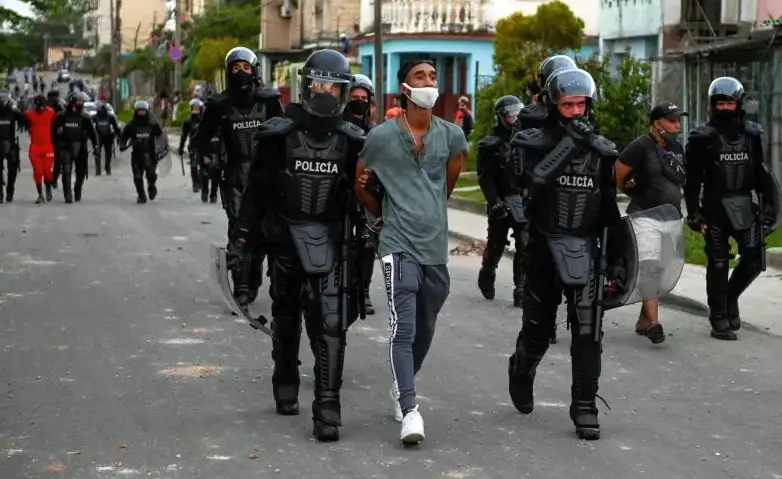For over six decades, more than half a million Cubans have been detained or jailed for political reasons. Political imprisonment in Cuba has created a profound humanitarian crisis, devastating thousands of families and leaving lasting scars across generations. Despite this grim history, efforts to enact an Amnesty Law to free tens of thousands unjustly imprisoned for exercising their rights face staunch resistance from the current regime. Ironically, this same regime owes its existence to an Amnesty Law—the May 1955 legislation that freed Fidel Castro, Raúl Castro, and others after their violent assaults on the Moncada Barracks. Unlike the revolutionary paramilitaries of 1953, today’s political prisoners are jailed for peaceful protests, not acts of violence or terrorism.
Today Cuba ranks as the Latin America’s second-largest jailer of political prisoners, after Venezuela, with 1,117 individuals currently behind bars, including 120 women and 30 minors. Tens of thousands more are imprisoned under arbitrary charges like Pre-criminal Penal Disobedience, targeting individuals for perceived potential offenses without any crime committed. It is unknown how many of these individuals were arrested specifically for their political beliefs.
Families of Cuban political prisoners report horrific conditions: denial of medical care, isolation, sexual violence, beatings, malnutrition, and torture. Pro-democracy leader José Daniel Ferrer, arbitrarily detained since July 2021, endures beatings, isolation, and 20 months without family visits for refusing exile and choosing to stay in Cuba to fight for freedom.
The arrest of journalist José Gabriel Barrenechea Chávez, accused of leading protests in Encrucijada, Villa Clara during Cuba’s blackout, highlights the regime’s repression. Facing sedition charges for dissent, Barrenechea has begun a hunger strike to protest his arbitrary detention.
The campaign by Latinoamérica21 and others for Barrenechea’s release underscores a global call to free all Cubans unjustly detained for exercising fundamental human rights, including freedom of expression, association, and peaceful protest.
Building on this momentum, at a time when Cuba has more people arbitrarily detained than in previous decades, the Amnesty Law initiative spearheaded by the Council for Democratic Transition in Cuba (CTDC)—a coalition of organizations on and off the island—offers a potential solution. Supported by pro-democracy leaders in prison and the families of political prisoners, the initiative provides a legal pathway to justice.
Announced on February 24, 2022, the Amnesty Law initiative faced delays due to legal hurdles imposed by the Cuban regime. The CTDC now plans to relaunch it on Human Rights Day, renewing their call for the release of political prisoners.
In a country where laws and practices violate international human rights standards, the proposed Amnesty Law offers a transformative solution. It would extinguish penal responsibility, erase convictions, and clear records, potentially freeing tens of thousands imprisoned for politically motivated offenses or arbitrary pre-criminal charges. Requiring approval by the National Assembly, the CTDC’s proposal is pivotal in decriminalizing dissent, affirming the opposition’s right to exist, and restoring sovereign rights to the Cuban people.
Changing the law within Cuba’s totalitarian system is an uphill battle. According to the 2019 Constitution, 10,000 signatures are required for a bill to be considered, but these signatures are non-binding. A lesser-known legislation, Law 131, mandates that signatories obtain voter certifications from the National Electoral Council in Havana. For most citizens outside the capital, travel costs far exceed the average monthly salary, effectively disenfranchising them.
These legal barriers, coupled with the persecution and surveillance of Cuba’s opposition, make mobilization amid blackouts and severe shortages daunting. Yet, the plight of political prisoners and their families remains a powerful force driving Cubans to rise for justice.
Any citizen-driven legislation has historically required some political will from those in power for its passage. In Cuba, that will is entirely absent. When Oswaldo Payá’s Varela Project gathered 25,000 signatures for democratic reforms, the regime responded with mass imprisonments and the assassinations of Payá and Harold Cepero.
Despite challenges, leveraging legal frameworks can be effective in authoritarian contexts. Venezuela’s opposition exposed electoral fraud in the July 28 elections, proving Edmundo González’s majority victory through electoral records, recognized by the EU and U.S. This success, achieved under severe repression, demonstrates the power of organized activism and citizen mobilization.
Since the Cuban regime’s July 2021 crackdown, which saw thousands detained, international solidarity with Cuban political prisoners has grown. The European Parliament’s September 19 resolution, demanding the release of José Daniel Ferrer and all political prisoners, passed with strong support, highlighting global backing. Cuban pro-democracy activists must leverage this momentum, urging the EU to tie its cooperation agreements to human rights conditions.
The U.S., with its maximum-pressure policies, and Canada, through platforms like the UN Human Rights Council, are well-positioned to aid these efforts. Latin America, scarred by dictatorships, has been slow to support Cuba’s democracy movement, but this is changing as crises in Venezuela and Nicaragua expose Castro’s totalitarian legacy, embraced by autocrats in Caracas and Managua. Amid democratic setbacks and anti-U.S. rhetoric, calls for the release of Cuban political prisoners are growing from civil society, regional forums and political parties. The region’s transitions highlight the risks of autocrats exploiting amnesty laws, offering valuable lessons for Cuba’s opposition.
The past two decades in Cuba show that sustained pressure is key to freeing political prisoners. Between 2010 and 2011, 75 Black Spring prisoners, sentenced to 6–28 years, were released under conditional licenses and exiled. Their freedom resulted from internal pressure and international condemnation, including demonstrations by the Ladies in White, which led to negotiations with Raúl Castro and the Catholic Church.
An Amnesty Law in Cuba is not merely a political or legal goal—it is a moral obligation to those who embody courage and resistance against repression. The regime’s continued refusal to heed popular will and its stubborn insistence on unjustly imprisoning thousands demand a decisive response: political imprisonment is barbaric and unacceptable. Democratic nations must stand on the right side of history and condition relations with Cuba on the immediate and unconditional release of all political prisoners—not through exile or house arrest, but as free citizens with the right to remain and peacefully fight for democracy.












